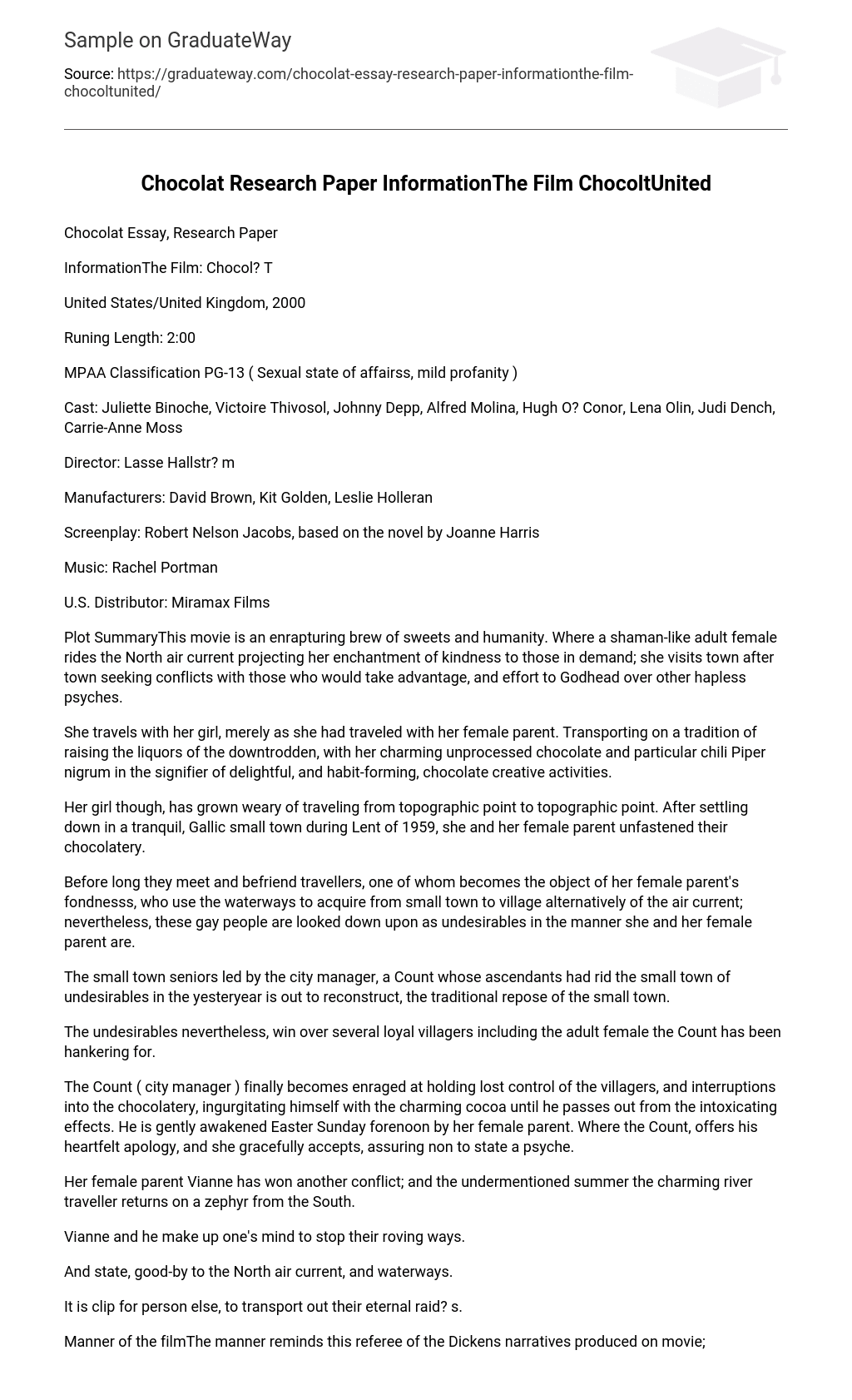This movie is an enrapturing brew of sweets and humanity. Where a shaman-like adult female rides the North air current projecting her enchantment of kindness to those in demand; she visits town after town seeking conflicts with those who would take advantage, and effort to Godhead over other hapless psyches.
She travels with her girl, merely as she had traveled with her female parent. Transporting on a tradition of raising the liquors of the downtrodden, with her charming unprocessed chocolate and particular chili Piper nigrum in the signifier of delightful, and habit-forming, chocolate creative activities. Her girl though, has grown weary of traveling from topographic point to topographic point. After settling down in a tranquil, Gallic small town during Lent of 1959, she and her female parent unfastened their chocolatery.
Before long they meet and befriend travellers, one of whom becomes the object of her female parent’s fondnesss, who use the waterways to acquire from small town to village alternatively of the air current; nevertheless, these gay people are looked down upon as undesirables in the manner she and her female parent are. The small town seniors led by the city manager, a Count whose ascendants had rid the small town of undesirables in the yesteryear is out to reconstruct, the traditional repose of the small town. The undesirables nevertheless, win over several loyal villagers including the adult female the Count has been hankering for.
The Count ( city manager ) finally becomes enraged at holding lost control of the villagers, and interruptions into the chocolatery, ingurgitating himself with the charming cocoa until he passes out from the intoxicating effects. He is gently awakened Easter Sunday forenoon by her female parent. Where the Count, offers his heartfelt apology, and she gracefully accepts, assuring non to state a psyche.
Her female parent Vianne has won another conflict; and the undermentioned summer the charming river traveller returns on a zephyr from the South.Vianne and he make up one’s mind to stop their roving ways. And state, good-by to the North air current, and waterways. It is clip for person else, to transport out their eternal raids.
Manner of the filmThe manner reminds this referee of the Dickens narratives produced on movie; such as, Oliver Twist, and the many versions of the immortal, Christmas Story: the countrified scenes, the sunglassess of lighting, the cryptic mists, the music, the characters, and the narrative. All combine to give a mystical, charming feel to this fable.
Cardinal characters and their developmentJuliette Binoche portrays Vianne, an puzzling, charming, yet scandal-baiting adult female, with a gift of penetration into what sweet arouses her clients but of class, any creative activity she chooses includes the particular intoxicating ingredient? Vianne is following a way, or naming of her maternal ascendants the Mayans.
Victoire Thivosil portrays Anouk a close mirror image, in looks every bit good as mode, of her female parent with the exclusion of her female parent’s mobile ways. She is lonely and unhappy, and at 12 years-of-age, wishes to settle in this bantam small town, travel to church, and have a sense of belonging, instead than uprooted from clip to clip.
Alfred Molina portrays the Count de Reynaud, who is the city manager of the small town. He is a pious, yet strong willed, and somewhat oblique, character that cares about his small town, its mores, and the tradition of repose developed by his ascendants. He is besides fighting with an internal quandary; his married woman the Countess has left him.
Judi Dench portrays Armande Voizin, Vianne’s decadent and diabetic landlady, who flaunts her non-conformity to the discouragement of her girl, Carolyn. Vianne turns to her, of all people, for advice on how she and Anouk may be accepted by the town. Throw me a party, is Armande’s answer, It’s my seventieth birthday, allow’s show the assholes we ll go down singing.
Aurtien-parent Koenig portrays Luc Clairmont, the cryptic grandson who Vianne hires to pull a portrayal of his grandma Armande; really, Vianne is interrupting his female parent’s prohibition on interacting with his grandma. Carrie-Anne Moss plays Carolyn Clairmont, Luc’s female parent. She has late become a widow who is, harmonizing to Armande, excessively protective of her boy. She is besides the Counts secretary and object, though covertly, of his fondnesss.
Johnny Depp portrays Roux, a seedy Irish instrumentalist who is the leader of the alleged River Rats who arrive to endanger the town’s moral character. He besides becomes the object of Vianne’s fondnesss. Lena Olin portrays Josephine Muscat. Josephine the arch and abused married woman who villagers say walk-ins to her ain melody. Peter Stormare portrays Serge Muscat the non so pleasant, nor bright, caf owner.
Hugh O Conor portrays the novice priest Pere-Henri who eventually prepares his ain preachment for Easter services, presenting a message that relieves the villagers of their load of self-denial and piousness, and lifts their liquors for the approaching twelvemonth. The cardinal subject presented in the movie seems to be, a substance in this instance, chocolate assorted with a particular chili Piper nigrum, a liberating, aphrodisiac; whereas, church and communities of religion are oppressive.
In add-on, should the river rats, itinerants, and roamers, along with self-indulgent, self-destructive old adult females and unwed female parents who sleep around, be held in high-esteem. Should humanity encompass the other ancient alcohols: cocaine, hashish, baccy, opium, intoxicant, and heroin? One might inquire? why has Vianne been run out of small town after small town, and why does Anouk dislike cocoa? Why does she non cognize who her male parent is? Leads one to see the messages being sent our kids and us by film makers?





